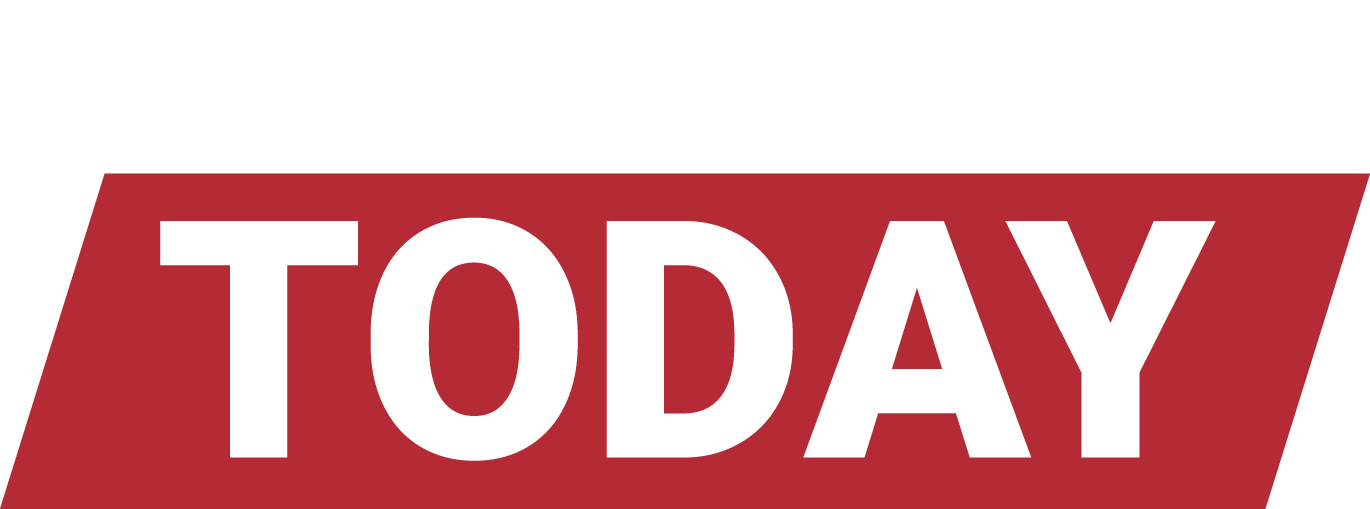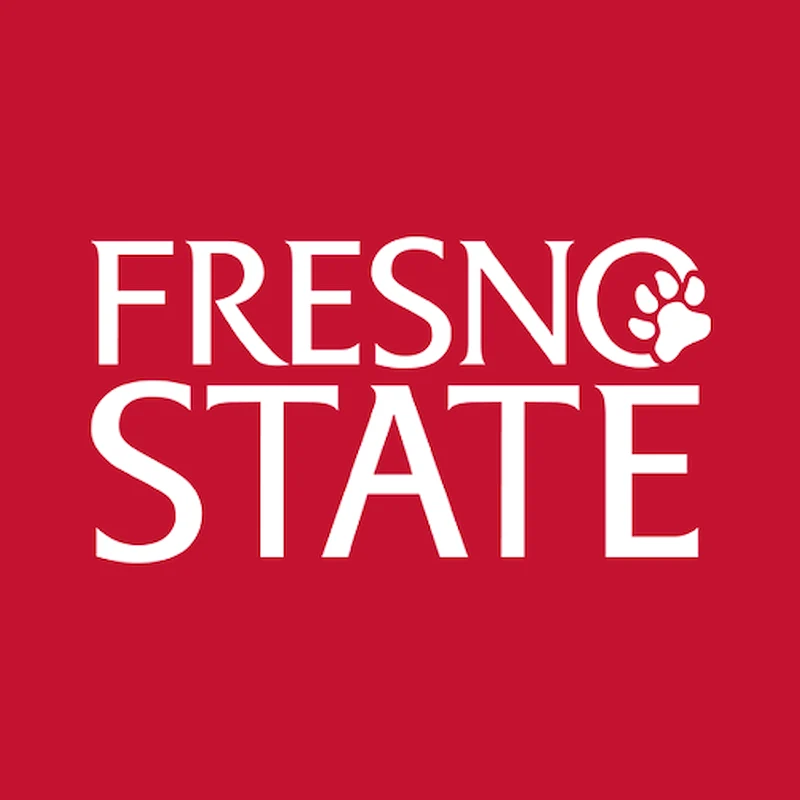Every day when he travels to and from campus, Dr. Rolston St. Hilaire, dean of the Jordan College of Agricultural Sciences and Technology, enjoys driving past a pair of new pivot irrigation systems, some of the newest improvements on Fresno State’s campus farm.
The new systems were built as part of a one-time, $18.75 million allocation from the state assembly to each of the four California State University agricultural colleges. The funding is earmarked for each of their campus farms to make important updates and renovations, integrate new technology and encourage more sustainable practices that are beneficial for student learning.
The 24-foot tall irrigation unit is easy to spot with its hanging spray hoses that irrigate alfalfa hay, corn silage and triticale fields near Chestnut and Bullard avenues.
As each unit rotates in a circle around an 18-acre area, it has an additional arm that extends outward to reach each corner and maximize coverage. The system incorporates highly-automated software that allows farm staff to operate the equipment remotely by smart phone and can be tied to other meteorological data.
The equipment can be synced to run at night or early in the morning when energy costs are cheaper at non-peak usage times, and can apply fertilizers and pest control products through the same lines, which can reduce labor costs.
The new unit irrigation also allows the farm to double its amount of alfalfa fields from 18 to 36 acres and raise more of its livestock feed on campus for cost savings.
“We are thankful to the state for helping us add state-of-the art equipment that will help us modernize the farm,” St. Hilaire said. “Incorporating technology like this irrigation system will pay dividends, both economically and environmentally. The unit allows our staff to more efficiently manage water and other inputs that will improve crop health while allowing us to expand the range of crops that we can sustainably grow.”
Ag Tech Day
Growers can see this irrigation equipment up close at a campus Ag Tech Day demonstration from 7 to 11 a.m. Friday, Oct. 31, hosted by the Center for Irrigation Technology.
The ninth annual event is free to the public, and will also offer demonstrations of agricultural drone equipment on the campus farm and a presentation about updates to the state’s Sustainable Groundwater Management Act.
A lunch and expo featuring ag equipment, service and technology vendors follows at the Fresno State Water, Energy and Technology Center at 11:30 a.m.
Additional upgrades
The state’s additional funding has also helped the campus farm’s 18 units upgrade their entire fleet of farm and service trucks and purchase an electric-powered tractor, forklifts, utility vehicles and carts – many of which have autonomous potential.
Many of these vehicle expenditures were leveraged through additional funds and incentives from rebates tied to the state’s Clean Off-Road Equipment and San Joaquin District Air Resources Board programs.
A new drone has been purchased to help modernize crop management methods. Farm staff are being trained on its use and the new equipment can be used on a majority of the 1,000-acre campus farm to better manage pest and crop health needs.
In the past year, the campus horticulture nursery has received notable irrigation, ventilation, heating and cooling equipment updates that were completed in spring 2025 to its seven greenhouses.
The new equipment’s automated software will help to lower energy costs, improve plant health and extend growing seasons. New rolling benches have also increased the nursery’s capacity, which includes a propagation lab, lath house, demonstration gardens and a new vertical farm. The state funds were supplemented by irrigation equipment from Netafim, and some of the updates were installed by students with staff guidance to enhance their learning experience.
Feed management operations at the campus dairy are benefiting from a new silage pad that was completed in the spring. The concrete subsurface will cut down on corn silage waste from the former dirt footprint, provide better drainage, and make it easier for students to move feed with large equipment. The campus silage area can also better integrate crops from the nearby fields that can be stored longer and offer higher quality of the nutritious ration.
New flooring and drainage has been installed inside the Macebo Dairy Unit, a new feed wagon was purchased and repairs were made to a wind-damaged commodity barn. Other future projects are planned to improve the dairy facility’s grading, drainage and shading.
Viticulture and enology
The Fresno State Department of Viticulture and Enology’s nationally-respected reputation as a leader in grape and wine science will be enhanced through a series of renovations at the Donald E. Gumz Enology Building. Its teaching and research areas are under construction this fall and will unveil space to make beer and spirits when it reopens in the spring. Fundraising efforts are underway to purchase and install a brewhouse and pot still.
An adjacent refrigeration area will be updated and will feature a new wine library to store donated wines, special collection wines and Fresno State Winery vintages. When it opened in 1997, the winery was the nation’s first bonded winery on a college campus. Today it is still the largest, and students, faculty, staff and supporters will be able to see wines that date back to its first editions nearly 30 years ago.
The winery has also purchased new concrete storage tanks that offer white wines the best features of wood barrels and stainless steel tanks, thanks to its porous composition and uniform temperature attributes. It also received a discount on the purchase of a new Müller pot still, which will allow the winery to create a wide variety of spirits for special edition products.
The winery is also using a new Defranceschi-SACMI wine press this fall that was donated by the company. Students are enjoying the chance to run the easy-to-operate equipment that also has better, larger and faster extraction features and is more gentle on the grapes in the production process.
An outdated, 10-acre block of Cabernet Sauvignon wine grapes were removed by Fowler Brothers Farming, which demonstrated the removal and disposal method to mechanized agriculture and viticulture classes this fall.
The vineyard is also looking to update its irrigation equipment with an automated system funded by a grant managed by Momentum from the California Energy Commission. The four-year project, which aims to be in place by 2026, will demonstrate methods to lower energy costs through an hourly flex pricing program, while maintaining high agricultural production efficiency. This grant will fund students to build management software that integrates with irrigation equipment and software by Wiseconn, a campus agricultural supporter.
Additional units
The campus meat science lab will reopen in the winter and will showcase a new refrigeration unit and renovated flooring. The space is also utilized for classes for the meat science program, which is regarded as one of the nation’s finest. Students produce a wide range of dried and cured products and popular sausage products, many of which feature student-designed recipes and other beef, chicken, lamb and pork products for the Gibson Farm Market The campus is coordinating the planning for a new meat processing facility that will feature modern processing, cooking, storage and training facilities.
The nearby beef, equine, sheep and swine units have received facelifts with exterior repainting now complete. Since these units manage animal health and welfare needs 24 hours, 7 days a week, a student manager often lives at each unit. Each unit has received new appliances with the help of ASI campus student support funds, and the sheep unit student quarters also received renovations from a private donor.
The campus beef unit is in the process of replanting its fields and installing more efficient irrigation systems, and a sheep pasture renovation project is planned for spring 2026.
Many of the Jordan College’s faculty, staff and 1,700 students are drawn to Fresno State because of the campus farm, which represents the agricultural diversity of the nation’s leading agricultural area, and serves as a living laboratory for classes, research projects and community outreach events.
Over 100 students also work on the farm throughout the year to gain valuable training for their careers. Central Valley agricultural employers are often attracted to hire Fresno State students for internships and jobs, since they have gained thorough, hands-on experience on the campus farm.
“All of these modernization projects are not only making the farm more sustainable and efficient, but they’re enhancing students’ ability to learn how to use the latest precision and automated agricultural technology,” St. Hilaire said. “The Fresno State farm is a special place because of its on-campus location and easy access for classes, so we’re also thankful to our industry supporters who are helping us make additional updates and support our strategic vision to better help our students and college shape the future of Central Valley agriculture.”


